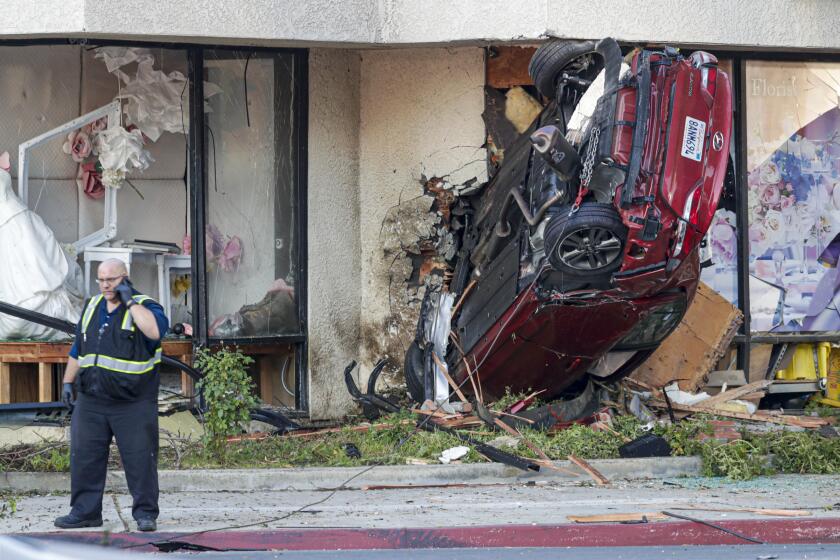Editorial: Attacks on police are hateful, but are they hate crimes?

Should the law treat attacks on police officers as “hate crimes” in the same way it does attacks on racial and religious minorities? A movement known as “Blue Lives Matter” — an unsubtle answer to “Black Lives Matter” — believes so and, unfortunately, it’s gaining converts.
Earlier this year Louisiana expanded its hate-crime statute to provide for additional penalties for people convicted of attacking police officers and first responders. The law previously provided for enhanced penalties when the victim of a crime of violence was targeted on the basis of several other factors including race, gender, religion and sexual orientation.
Meanwhile, U.S. Rep. Ken Buck (R-Colo.) has introduced the Blue Lives Matter Act of 2016. The bill would expand the federal hate-crime statute to make it a crime to target law enforcement officers for acts of violence.
Especially after the killings of police officers in Baton Rouge, La., and Dallas, this campaign is likely to continue to gain adherents. But it’s based on a misunderstanding of what hate crime statutes are designed to do. Every violent attack on a human being is hateful, but as originally conceived, a hate crime is also rooted in a pervasive and especially pernicious prejudice that infects society at large. The paradigm of such prejudice in this country is racism, the toxic taproot of both racial violence against minorities and day-to-day discrimination.
New York’s hate-crime statute explains the justification for such laws well: “Crimes motivated by invidious hatred toward particular groups not only harm individual victims but send a powerful message of intolerance and discrimination to all members of the group to which the victim belongs. Hate crimes can and do intimidate and disrupt entire communities and vitiate the civility that is essential to healthy democratic processes.”
Hate-crime laws deal with bias-motivated acts of violence in one of two ways: either by making them crimes in themselves (as the principal federal hate-crime statute does) or by providing harsher punishment for someone convicted of a traditional offense such as assault and battery if the defendant chose his victim on the basis of a characteristic such as race. In either case, the evil addressed by the law extends beyond a specific criminal act.
It is possible to provide additional penalties for attacks on police officers without declaring them hate crimes.
In defending his legislation, Buck said: “Whether based on skin color or uniform color, a crime motivated by hate is not going to be tolerated in America.” Of course no one should tolerate attacks on police officers or object to punishment for those who attack them. But it’s specious to equate distrust of — or even hostility to — law enforcement with the sort of pervasive racial or religious prejudice hate-crime statutes are designed to address.
Moreover, it is possible to provide additional penalties for attacks on police officers without declaring them hate crimes. Even before Louisiana amended its hate-crime statute, state law provided for longer sentences for those who committed attacks on a “peace officer.”
As much as we disagree with the campaign to add police officers to the list of groups covered by hate-crime laws, we understand why the idea has gained traction. In recent years hate-crime laws at both the state and federal level have evolved, expanding to include an increasing number of categories of victims. That creates the temptation to expand the coverage further to encompass “our” group.
The federal hate-crime statute allows for the prosecution of acts of violence motivated by the victim’s race, color, religion, national origin, gender, sexual orientation, gender identity or disability. Yet reports of bias-related crimes in some of those categories is vanishingly small. (In 2014, according to the FBI, only 1.5% of single-bias incidents — those in which only one trait was targeted — involved disability.) State hate-crime laws have been expanded to include crimes targeting not only the physically and mentally disabled but also the elderly and the homeless. When the federal hate-crime law was expanded in 2009, Republicans unsuccessfully tried to have attacks on veterans classified as hate crimes.
This overbroad definition creates two impressions in the popular mind: that an act of violence isn’t being treated seriously unless it is designated a “hate crime” and that inclusion in the list of categories is itself a mark of respect. “Black lives matter” because crimes motivated by racism are hate crimes; therefore, the thinking goes, attacks on the police must be declared a hate crime to send the symbolic message that “blue lives matter.” By that logic, every crime of violence would have to be declared a hate crime.
Police need to be protected and those who attack them must be punished severely. But the issue is safety, not “hate.”
Follow the Opinion section on Twitter @latimesopinion and Facebook
More to Read
A cure for the common opinion
Get thought-provoking perspectives with our weekly newsletter.
You may occasionally receive promotional content from the Los Angeles Times.






